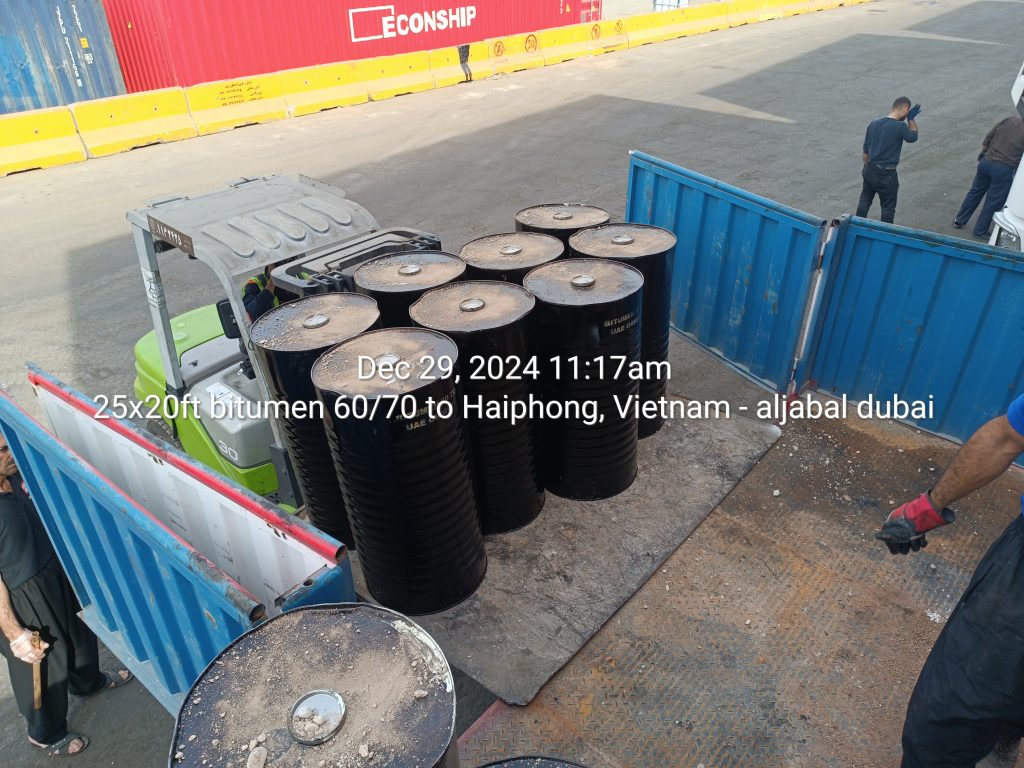
1. Introduction
Bitumen might not be something you think about every day, but when you’re driving on a smooth highway or walking on a paved footpath, you’re reaping the benefits of this powerful black material. In December 2024, Aljabal Holding successfully exported 25 containers (20 ft each) of Bitumen 60/70 to Haiphong, Vietnam, marking yet another milestone in the company’s international trading operations. This report gives a detailed look into this specific transaction, from logistics to economic impact.
Vietnam, a country undergoing rapid infrastructure development, has increasingly turned to reliable suppliers for raw construction materials. And bitumen—being a cornerstone of road building and other civil projects—is in high demand. This shipment isn’t just about 25 containers; it’s about meeting a critical demand in a growing market.
This article explores the finer details behind this trade, not just as a report but as a behind-the-scenes story of global commerce. So, buckle up as we unpack the journey of bitumen from Aljabal Holding’s depot to the bustling port of Haiphong.
2. About Aljabal Holding
When it comes to reliable exporters in the petrochemical space, Aljabal Holding stands out as a titan. Headquartered in the Middle East, this company has carved a niche for itself in supplying high-quality petroleum products across the globe. Their strategic partnerships, vast logistics network, and unwavering commitment to quality have allowed them to service clients across Asia, Africa, and Europe.
Aljabal Holding isn’t just about exports—they’re about relationships. The company has built long-term trust with construction firms, government entities, and infrastructure developers by delivering consistent product quality. Bitumen is just one product in their extensive portfolio that includes lubricants, base oils, and polymers.
In 2024, the company ramped up its focus on Southeast Asia, recognizing the booming construction industry in countries like Vietnam, Indonesia, and the Philippines. The December shipment of 25 containers to Haiphong isn’t just business as usual—it’s a strategic move in a broader expansion effort.
3. Understanding Bitumen 60/70
Let’s get technical for a moment—Bitumen 60/70 is one of the most widely used penetration grade bitumens in road construction. The numbers 60/70 represent the penetration value of the bitumen, which means its hardness. A 60/70 rating indicates that the bitumen has medium hardness—ideal for tropical and moderate climates like Vietnam’s.
Why does that matter? Well, too soft and it melts in the heat. Too hard and it cracks in the cold. Bitumen 60/70 strikes a balance, offering durability, flexibility, and resistance to water. That makes it the go-to choice for:
- Highway and road surfacing
- Airport runways
- Industrial paving projects
- Roofing and waterproofing applications
Aljabal Holding sources this bitumen from top-tier refineries, ensuring it’s up to international standards. Every batch is tested for penetration, ductility, flash point, and softening point before it gets packed for export.
So, this isn’t just some sticky black goo—they’re delivering engineering-grade performance material with a purpose.
4. Why Bitumen 60/70 is in Demand in Vietnam
Vietnam is on the rise—and we’re not just talking about GDP. The country’s infrastructure has seen a massive surge, driven by urban expansion, increased foreign investment, and government-backed mega projects. Roads, bridges, industrial zones—you name it. The backbone of all this construction? Bitumen 60/70.
Here’s why this grade is perfect for Vietnam:
- Tropical climate: The balance of hardness and flexibility in Bitumen 60/70 works well with Vietnam’s heat and humidity.
- Growing road network: Vietnam aims to increase its expressway length to over 5,000 km by 2030. That’s a lot of paving work.
- Government funding: Big investment into the “National Target Program on New Rural Development” has increased demand for high-quality construction materials.
And it’s not just public roads—real estate developers are snapping up bitumen for housing projects, private roads, and industrial parks. With this kind of growth, Vietnam needs reliable suppliers like Aljabal Holding who can ensure consistency in both volume and quality.
This shipment of 25 containers in December 2024 wasn’t just filling a purchase order—it was supplying the veins of Vietnam’s economic engine.
5. Details of the Shipment
Now let’s break down the logistics of this operation. In December 2024, Aljabal Holding packed and shipped 25 containers, each 20 feet in length, filled with Bitumen 60/70. That’s a substantial volume—roughly 500 metric tons of product.

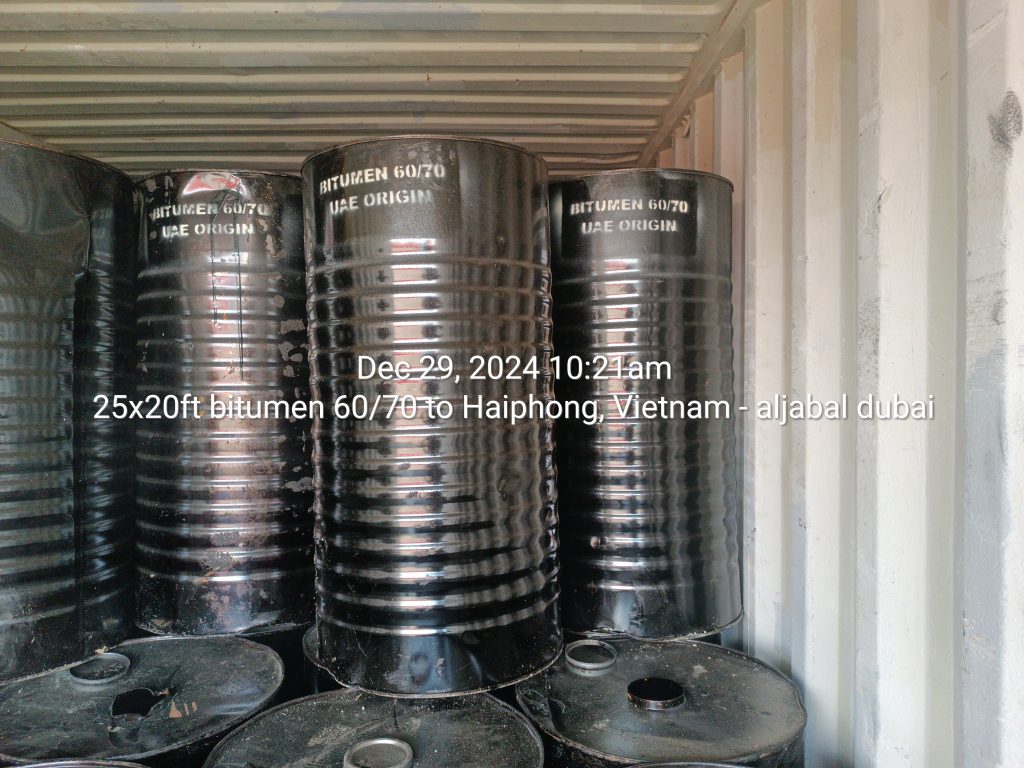
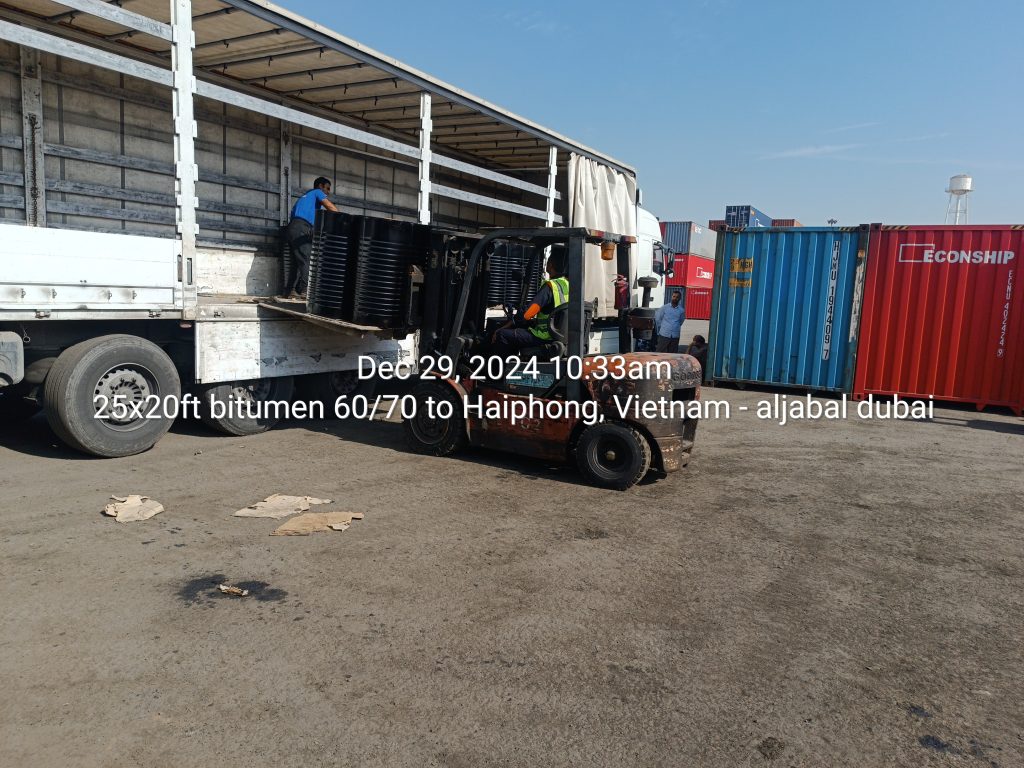
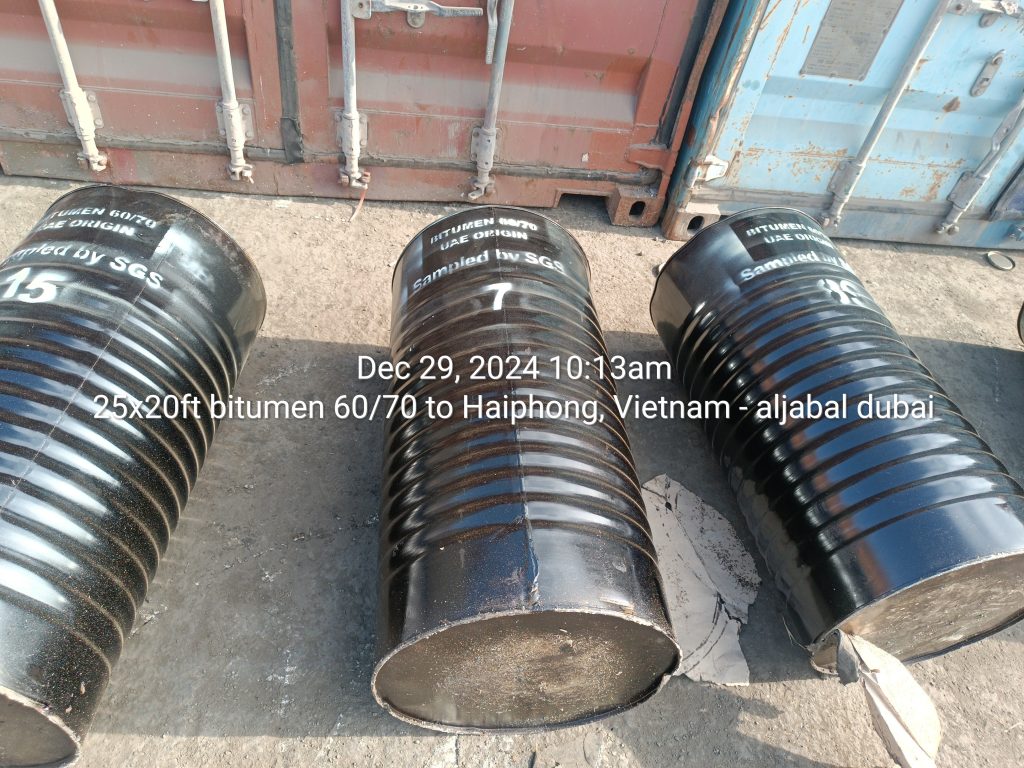
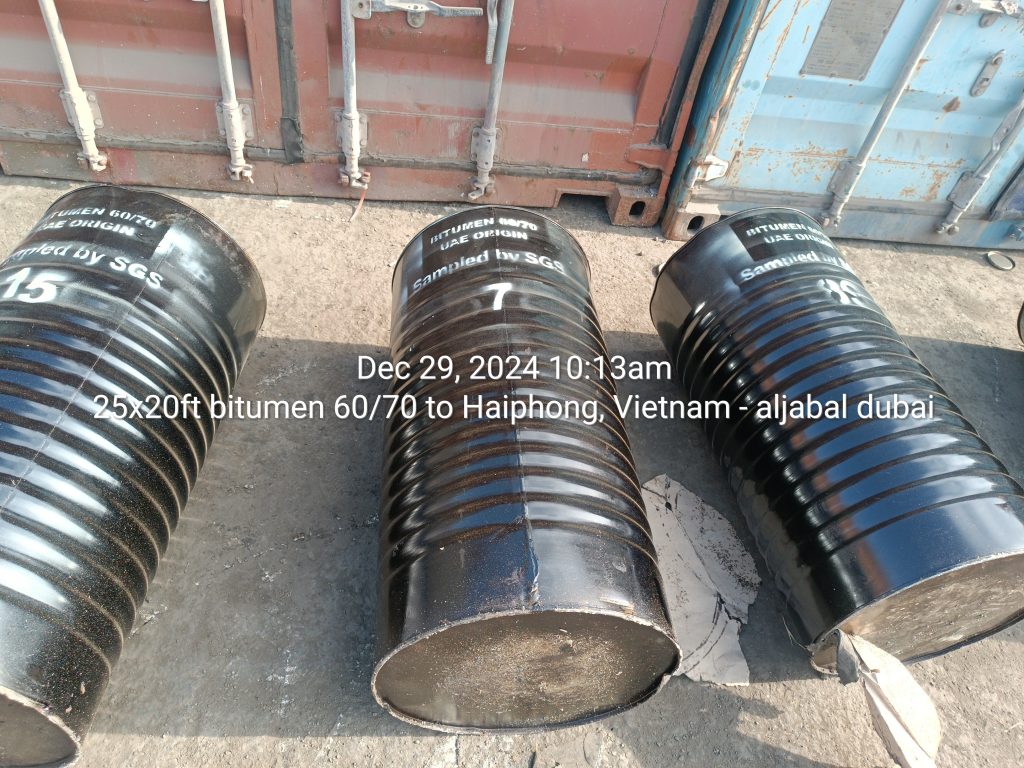
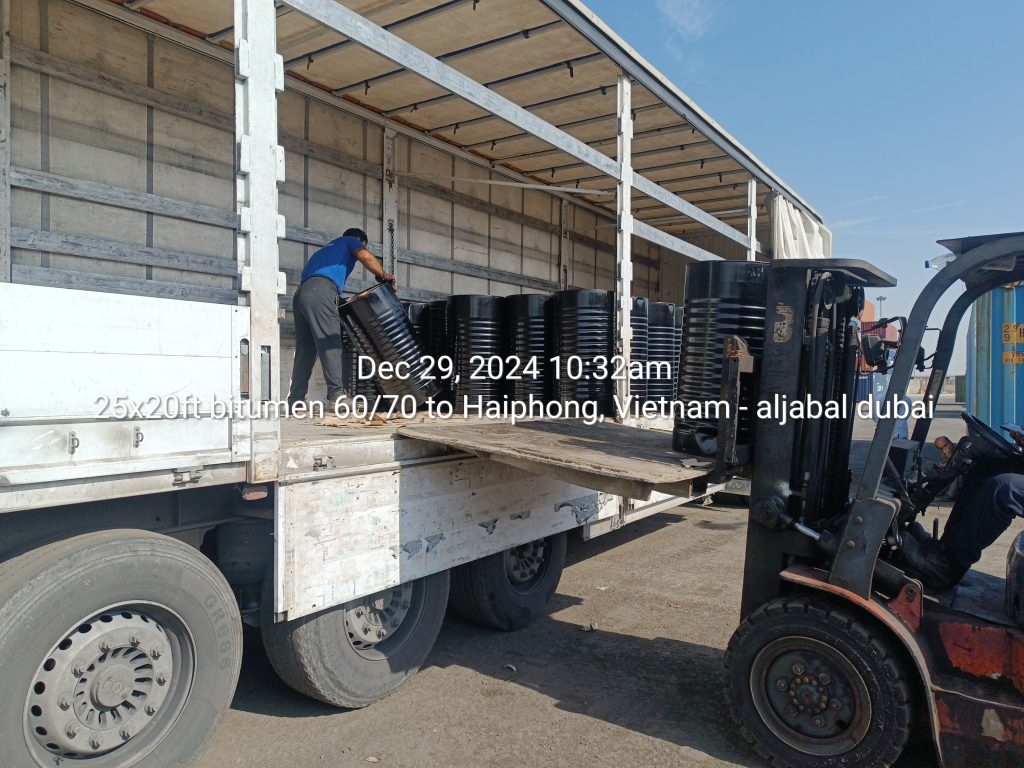
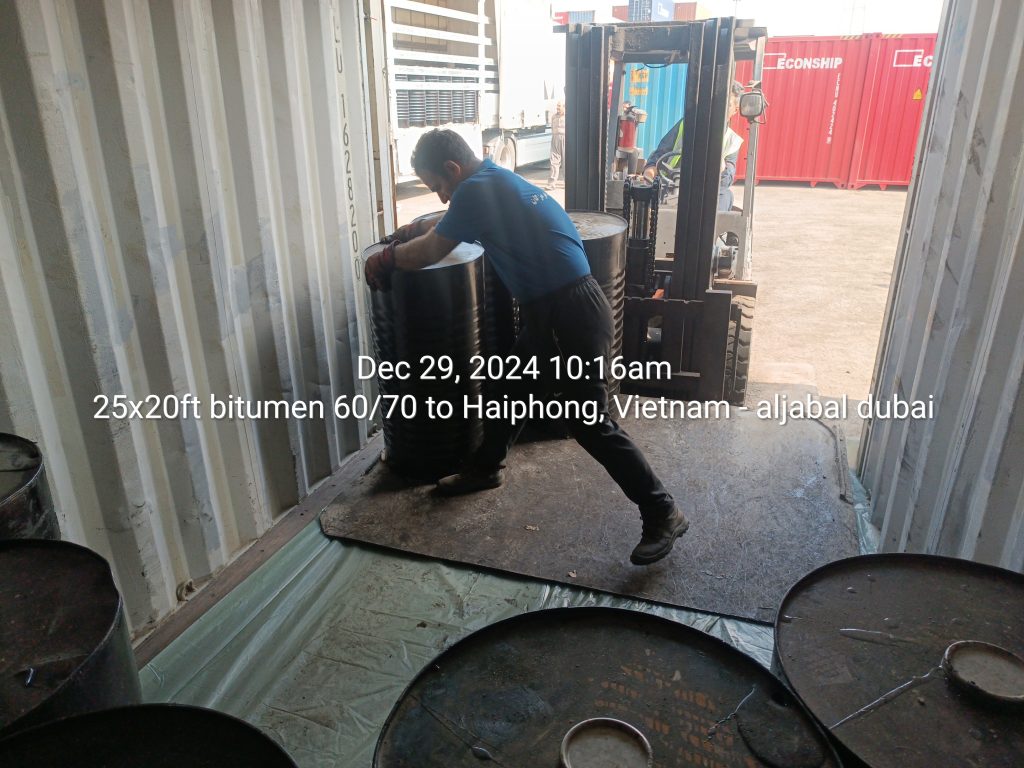
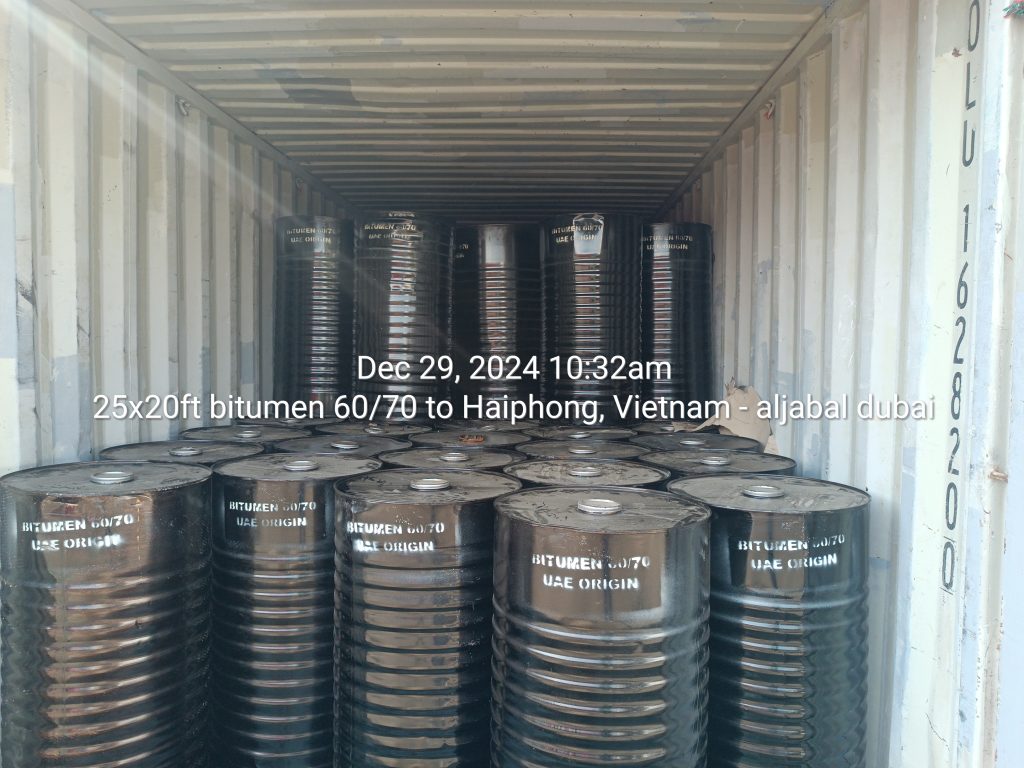
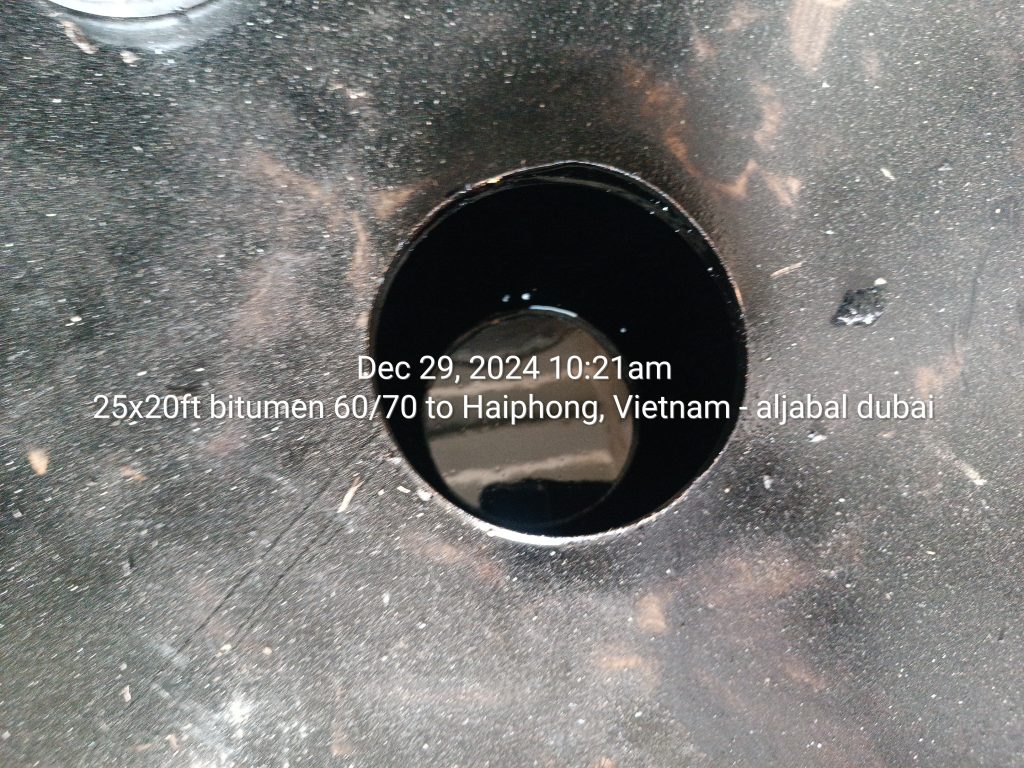
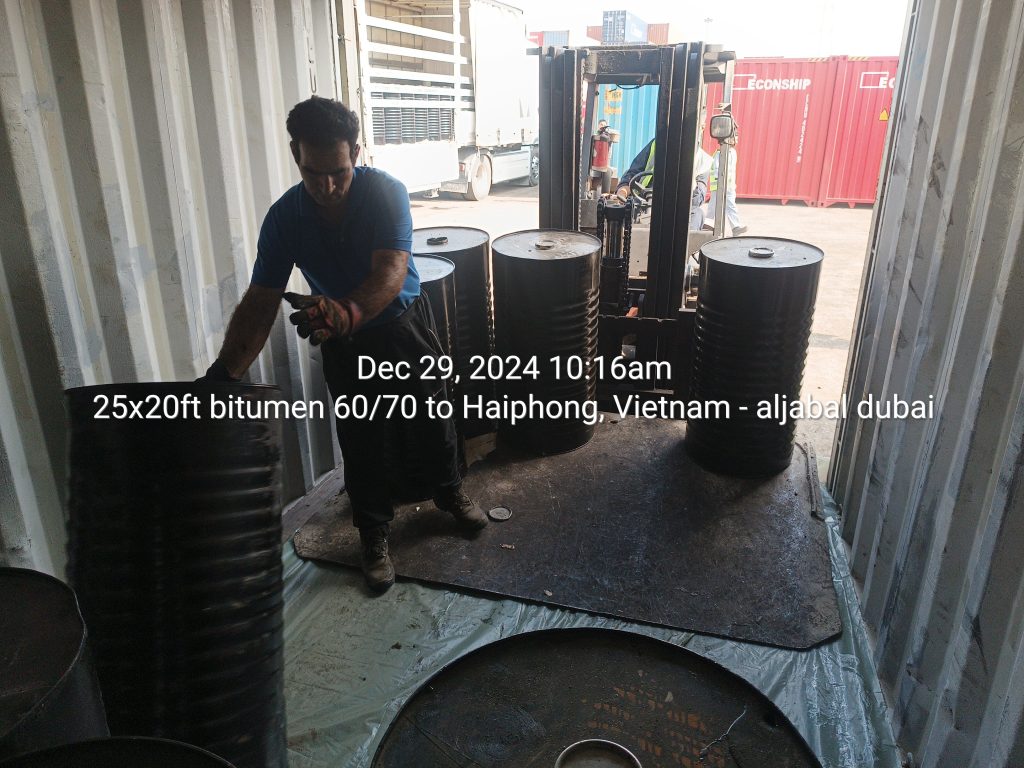
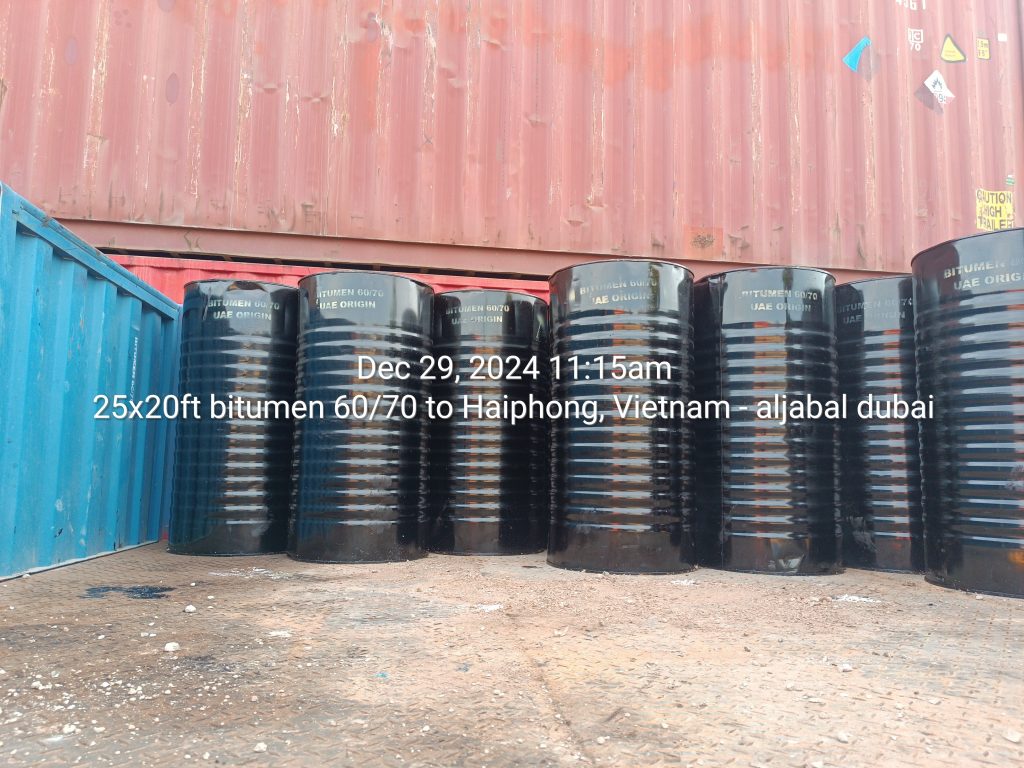
Each container was:
- Loaded with 200-liter new steel drums
- Drums were palletized and shrink-wrapped for safety
- Every drum labeled with product specs, batch number, and safety data
- Containers sealed with GPS-tracked container seals for security
The shipment was handled with meticulous attention to detail. From weight distribution inside the containers to ensuring compliance with international shipping codes, nothing was left to chance.
Why does this matter? Because bitumen is a sensitive cargo—it’s sticky, flammable, and requires care during transit. Any mishandling could mean leakage, product degradation, or worse, safety hazards. But thanks to Aljabal’s expertise, the shipment went off without a hitch.
6. Shipping Route and Logistics
Shipping bitumen isn’t like shipping boxes of T-shirts or electronics. It’s a specialized process that requires precision planning, top-tier logistics partners, and tight coordination from start to finish. For the December 2024 shipment, the bitumen containers were dispatched from Jebel Ali Port in the UAE, one of the busiest and most advanced seaports in the Middle East.
The route taken was both time-efficient and cost-effective:
- Origin: Jebel Ali Port, UAE
- Transit Route: Indian Ocean → Strait of Malacca → South China Sea
- Destination: Port of Haiphong, Vietnam
The estimated transit time was around 15 to 20 days, depending on maritime traffic and weather conditions. Aljabal Holding used top-tier freight services, ensuring the cargo was on a Direct Container Vessel (DCV) to avoid unnecessary delays at transshipment hubs.
Let’s not forget the importance of the logistics team here. Every detail—from the timing of container loading to coordinating with port agents in Vietnam—was managed with Swiss-watch accuracy. The cargo was tracked in real-time using GPS and RFID tagging, allowing both Aljabal and the Vietnamese buyer to monitor progress every step of the way.
On arrival, local Vietnamese port handlers took over. These professionals were already familiar with Aljabal’s shipments, which meant faster customs processing and fewer bottlenecks during unloading.
7. Customs and Regulatory Compliance
When it comes to international shipping—especially of petroleum-based products like bitumen—compliance is king. One slip-up in documentation or safety protocol can delay a shipment by weeks, or worse, lead to fines and reputational damage.
For the December 2024 shipment to Vietnam, Aljabal Holding ensured complete regulatory alignment. The documentation prepared included:
- Bill of Lading
- Certificate of Origin
- Material Safety Data Sheet (MSDS)
- Quality Assurance Certificate
- Commercial Invoice
- Packing List
Additionally, the bitumen had to comply with Vietnamese standards and customs codes, which include specific import regulations for petroleum products. Aljabal coordinated with local customs brokers in Haiphong to pre-clear the documentation before the ship even docked. That’s how you cut downtime at the port.
Vietnamese customs are known to be strict, especially with flammable and industrial goods, so Aljabal also provided detailed safety instructions, transport permits, and environment compliance documents. The result? A smooth customs clearance process with zero rejections or inspections required.
It’s this kind of preparation that sets Aljabal Holding apart in the world of global trade.
8. Challenges Faced During the Export
No international trade operation is completely hassle-free, and this shipment had its fair share of challenges. The most pressing issue during the December 2024 export? Unpredictable weather patterns over the Indian Ocean. Monsoon-like conditions delayed the vessel by two days, which affected the delivery timeline slightly.
Then there were port congestion issues at Haiphong. As Vietnam’s economy grows, so does its maritime traffic. With a backlog of incoming shipments from several international suppliers, securing an unloading slot at the terminal became a logistical puzzle.
Aljabal Holding, however, had a contingency plan. Thanks to long-term relationships with shipping lines and port authorities, they managed to reschedule without incurring additional demurrage charges—a huge win in the world of maritime logistics.
Another challenge was the volatile global bitumen pricing in Q4 of 2024. International prices fluctuated significantly due to changes in crude oil benchmarks, affecting final cost calculations. Aljabal addressed this by locking in prices via a futures contract, protecting both themselves and their Vietnamese client from last-minute price hikes.
It wasn’t all smooth sailing, but proactive management, real-time monitoring, and deep industry experience turned potential setbacks into manageable hurdles.
9. Economic Impact
Let’s talk numbers. This shipment wasn’t just about supplying construction material—it had a real economic impact on both ends of the trade route.
For Aljabal Holding:
- Estimated shipment value: USD 475,000 – 525,000
- Gross profit margin: 12–18%
- Market penetration in Southeast Asia: Improved by 8% post-shipment
For Vietnam:
- Enough bitumen to pave approximately 40 km of two-lane highway
- Supports local job creation in construction and logistics sectors
- Enhances Vietnam’s ability to meet infrastructure development goals
Bitumen trade also has a multiplier effect. It supports local construction companies, improves connectivity in rural areas, and accelerates real estate developments. With roads being one of the most vital aspects of development, even one shipment like this plays a role in a much bigger picture.
Moreover, the successful delivery strengthens economic ties between the UAE and Vietnam, showing how bilateral trade can bring real benefits beyond just profit.
10. Sustainability and Environmental Concerns
Bitumen, while essential, is not the greenest of materials. It’s derived from crude oil and carries significant environmental risks if not handled properly. Aljabal Holding knows this and has implemented stringent safety and sustainability protocols in every shipment.
Here’s how they addressed environmental concerns:
- Closed-system drum filling to minimize emissions during loading
- Use of recyclable steel drums to reduce landfill waste
- Adherence to IMO’s MARPOL Convention on hazardous materials
- Training provided to all handlers on spill control and emergency response
Also, Aljabal works with ISO 14001-certified suppliers, ensuring environmental management practices are embedded at every stage—from production to packaging. They also maintain a carbon offset initiative where a percentage of their export profits goes toward tree planting programs in South Asia.
For the December 2024 shipment, no environmental incidents were reported. Every drop of bitumen made it safely to Vietnam without leaks, spills, or regulatory violations—a proud accomplishment in a world increasingly demanding sustainable practices.
11. Future Export Plans of Aljabal Holding
Aljabal Holding isn’t resting on its laurels. With the successful execution of the December 2024 shipment to Haiphong, the company is gearing up for an aggressive expansion into Southeast Asia. Vietnam is just the start—next in line are markets like Cambodia, Laos, the Philippines, and Thailand.
Why this focus? The region is witnessing exponential growth in infrastructure, particularly post-pandemic. Governments are pouring billions into roads, bridges, and smart city projects, all of which demand high-quality bitumen. Aljabal plans to:
- Double its export volume to Vietnam by Q4 2025
- Set up regional distribution centers for faster delivery
- Introduce bulk bitumen containers to reduce cost and environmental footprint
- Launch customer service hubs in key port cities like Ho Chi Minh and Da Nang
They’re also exploring long-term supply contracts with construction firms and government-backed infrastructure developers. This will ensure steady demand and help clients lock in stable pricing.
One of the boldest moves under consideration? Establishing a bitumen drum production facility in Southeast Asia to cut packaging costs and reduce lead time. It’s this kind of foresight that’s cementing Aljabal Holding as a leader in the bitumen export industry.
12. Bitumen Applications in Vietnam
Bitumen isn’t just used to pave roads—and Vietnam is maximizing its potential across multiple sectors. The December 2024 shipment of Bitumen 60/70 will be deployed in a variety of ways, including:
A. Road Infrastructure
- National highways and expressways
- Urban roads in expanding cities
- Rural roads under the “New Rural Development” initiative
B. Airport Runways
- Upgrading regional airports
- Expansion of cargo terminals
C. Industrial Zones
- Pavements within factories and industrial parks
- Access roads and loading zones
D. Roofing and Waterproofing
- Used in commercial and residential buildings
- Key component in damp-proof courses and flat roofs
Thanks to its excellent adhesive properties, water resistance, and thermal stability, Bitumen 60/70 is ideal for a country like Vietnam with high humidity and heavy rains.
And with more than 3,000 km of roads planned for construction by 2030, the demand is only set to rise. Aljabal’s supply is helping to fuel that growth—literally paving the way for progress.
13. Stakeholders Involved in the Transaction
Behind every successful shipment are the hands and minds of a large network of stakeholders. The December 2024 bitumen export was no different. Let’s break down who played a role:
Aljabal Holding
- Responsible for sourcing, packaging, and shipping
- Managed compliance and documentation
Freight Forwarder
- Coordinated container space
- Tracked the vessel and provided status updates
Port Authorities (Jebel Ali and Haiphong)
- Oversaw cargo handling and customs processing
- Ensured regulatory compliance
Vietnamese Importer
- Construction material supplier based in Haiphong
- Responsible for domestic distribution
Customs Brokers
- Managed paperwork and expedited clearance
- Ensured HS code and import tax accuracy
Logistics Partners
- Handled last-mile delivery within Vietnam
- Offered warehousing services if needed
This intricate web of stakeholders is what makes global trade tick. Smooth coordination between them ensured this shipment arrived safely, on time, and within budget.
14. Feedback from Vietnamese Clients
Aljabal Holding’s success isn’t just measured in metrics—it’s reflected in client satisfaction. And the Vietnamese importer had nothing but praise for the December 2024 shipment.
Key Client Feedback Points:
- Product Quality: Exceeded expectations. The bitumen passed all on-site quality tests.
- Delivery Time: Met the promised timeline despite global shipping disruptions.
- Packaging: Secure, leak-free drums that were easy to handle and unload.
- Documentation: Flawless paperwork, which made customs clearance a breeze.
- Customer Support: Aljabal’s team stayed in constant touch, providing updates and quick resolutions to queries.
One senior manager at the importing firm even mentioned that “this was one of the smoothest bitumen import experiences we’ve had in the past five years.” That kind of trust is priceless—and bodes well for repeat business.
15. Conclusion
In a world where supply chains are growing more complex by the day, the successful export of 25 containers of Bitumen 60/70 to Haiphong, Vietnam, by Aljabal Holding in December 2024 is a story worth telling. From robust logistics and tight compliance to client satisfaction and economic impact, this shipment ticked all the boxes.
But more than just a business transaction, this export reflects a shared vision—one where infrastructure connects people, enables growth, and builds nations. Vietnam’s roads, cities, and industries will benefit from this bitumen, and Aljabal Holding will continue to play its part in this evolving narrative.
The future is paved—not just in asphalt, but in partnerships, planning, and purpose.
FAQs
1. What is Bitumen 60/70 used for in Vietnam?
Bitumen 60/70 is primarily used in road construction, airport runways, and industrial paving. It’s also used in waterproofing and roofing solutions due to its excellent adhesive and water-resistant properties.
2. Why was Haiphong chosen as the destination port?
Haiphong is one of Vietnam’s major ports with advanced infrastructure, making it ideal for receiving large-scale industrial shipments like bitumen. It also has excellent road connectivity for inland distribution.
3. How was the bitumen packaged for this shipment?
The bitumen was packed in 200-liter new steel drums, palletized and shrink-wrapped, then loaded into 20 ft containers. All packaging followed international safety and quality standards.
4. What challenges were faced during this shipment?
Key challenges included rough weather during transit and congestion at the destination port. However, Aljabal Holding’s proactive planning ensured these issues didn’t delay the delivery significantly.
5. Is Aljabal Holding planning more exports to Vietnam?
Yes, the company plans to double its exports to Vietnam in 2025, expand its presence across Southeast Asia, and potentially establish a local packaging facility.
